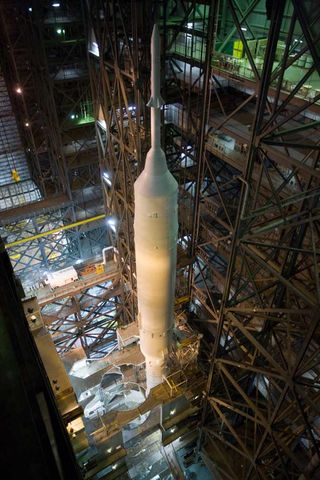NASA's Moon-Mars Chief Blasts 'False Claims'

The director of NASA'sembattled moon-Mars program says President Barack Obama's human spaceflightcommission is making false claims about the advantages of alternatives andignoring "anything positive" about the program NASA already has spent$9 billion on over the past five years.
In an e-mail obtained byFLORIDA TODAY, NASAProject Constellation Program Manager Jeff Hanley also says the committeeis "dismissive" of the recommendations of Columbia accidentinvestigators.
To treat astronaut crewsafety as a 'sine qua non' -- a given -- "is a cop out. . .plain andsimple," Hanley said in a candid, 3,376-word e-mail to Johnson SpaceCenter Director Michael Coats.
The panel was created toreview NASA's ongoing moon-Mars program and consider other options for theagency after the shuttle's retirement. The panel decided NASA's Constellationprogram is on "anunsustainable trajectory" and Obama should consider canceling NASA's AresI crew launcher and instead fly astronauts on commercial rockets.
Hanley said that idearaises significant legal issues and would put at risk future U.S. human spaceexploration.
"We are betting thefarm on severe speculation," Hanley told Coats, a veteran shuttle pilotand mission commander.
The blunt assessment of thecommission's executive summary, which was delivered to the White House on Sept.8, comes to light as the panel holds a final public hearing today. A fullreport by the 10-member committee, led by Lockheed Martin CEO NormanAugustine, is due at the White House by the end of the month.
Get the Space.com Newsletter
Breaking space news, the latest updates on rocket launches, skywatching events and more!
Efforts by e-mail andtelephone seeking comment from Augustine, executive director and chiefspokesman, were unsuccessful.
Hanley's comments"reflect the informed engineering judgment of someone who's been livingwith these issues for years," said Scott Pace, director of GeorgeWashington University's Space Policy Institute and a former NASA associateadministrator.
"Where I might differis that I think the Augustine Committee was clear in saying it was not makingrecommendations. Further, the document being discussed was an executive summaryso it's hard to say that evidence is lacking for various assertions as we justdon't know without the final report," Pace said.
NASA since 2004 has been oncourse to complete the International Space Station and retire its shuttle fleetby the end of 2010; develop a new U.S. crew transportation system by 2014 andthen return American astronauts tothe moon by 2020.
Project Constellation isdeveloping Ares rockets and Orion spacecraft as part of that mission, but thepresidential panel said it doubted NASA couldmeet those goals on time. And the panel suggested the commercial industrymight be able to deliver crew transportation services faster and cheaper.
"This group of smartpeople has looked at the riskiness of the commercial providers compared to theriskiness of NASA, and apparently come to the conclusion that the risks arecomparable," John Logsdon, a space policy expert at the SmithsonianInstitution's National Air and Space Museum, told FLORIDA TODAY earlier thisyear.
"They've lookedclosely at this and seem to have come to the conclusion that we are at a pointin the evolution of space transportation where a commercial provider couldbalance risk, cost and profit and make a business - with, it should be added,significant help from the government."
Hanley is not so sure.
In the e-mail and telephoneinterviews Wednesday, Hanley said U.S. commercial launch services have notdemonstrated they can to fly astronauts safely and reliably.
It's unclear whether thecompanies have the intellectual capital to develop complex crew escape systems-- a job not undertaken since the Apollo project, he said.
And it's unclear whetherthe U.S. government or a commercial crew transportation company would belegally liable for property damage or loss of life in the event of aChallenger- or Columbia-likedisaster.
"How could NASAblindly 'trust' them to 'get it right' and then indemnify them for any loss oflife?" Hanley said in the e-mail to Coats.
Hanley raised other concerns.
- On the development of a heavy-lift launcher:
The committee noted thatthe AresI launcher "has the advantage of projected very high ascent crewsafety" but claimed its development would delay the Saturn V-class Ares V.
"Great heavysigh," Hanley wrote. "This paragraph demonstrates either anintentional mischaracterization of the facts or a clear lack of understandingof Constellation."
The Ares I first-stage -- afive-segment version of the shuttle's solid rocket booster -- also will be usedon the Ares V.
The Ares I second stageengine -- an upgraded version of a Saturn V engine -- will propel the upperstage of the Ares V.
- On the potential use of upgraded versions of existing Atlas 5 or Delta 4 Heavy rockets for crew or cargo transport:
The committee claimed theuse of these rockets could potentially lower development and operations costs.
"This is a claimunsupported and unsubstantiated with any assessment or data," Hanley wrote.
- Video - NASA's Ares I-X Test Flight Unveiled
- Video - Back to the Moon with NASA's Constellation
- Video Show - NASA's Vision for Humans in Space
Published under licensefrom FLORIDA TODAY. Copyright ? 2009 FLORIDA TODAY. No portion of this materialmay be reproduced in any way without the written consent of FLORIDA TODAY.
Join our Space Forums to keep talking space on the latest missions, night sky and more! And if you have a news tip, correction or comment, let us know at: community@space.com.
Todd Halvoron is a veteran aerospace journalist based in Titusville, Florida who covered NASA and the U.S. space program for 27 years with Florida Today. His coverage for Florida Today also appeared in USA Today, Space.com and 80 other newspapers across the United States. Todd earned a bachelor's degree in English literature, journalism and fiction from the University of Cincinnati and also served as Florida Today's Kennedy Space Center Bureau Chief during his tenure at Florida Today. Halvorson has been an independent aerospace journalist since 2013.
